We often think of taking care of ourselves as being child-fre e, away from home, in quiet. But if that’s the definition of self-care, most moms and dads are going to get precious little of it.
e, away from home, in quiet. But if that’s the definition of self-care, most moms and dads are going to get precious little of it.
When we’re looking for alone time, we need to get creative. How can it be managed right where we are, without expending too much money or time? How can it be made doable even with small children? There’s always a way to care for yourself right where you are.
Here are three examples of how parents got creative in order to take better care of themselves. They’re about moms but this applies equally well to dads.
Experiment 1
Deon was feeling burnt out and needed a way to have space away from her family when she felt over the top. In one of our conversations, she told me about her bedroom. It had a lovely window seat that looked out onto a green field. The problem was it was the messiest room in her home. So together we came up with a list of things that she could easily do to make it an inviting space.
She cleared all the stuff off of the window seat and got a basket for her husband to put his stuff in—so it would stay cleaned off. She made changes in how they managed the laundry, so it wasn’t always piled on her bed. She painted a wall. She added her favorite books to the window seat.
Deon talked with her family. She told them that when it became difficult to react the way she wanted, she was going to her room to regroup for 5 minutes. She would take a personal time out. She asked for their support in allowing her to do this when she needed to. They all agreed to help her out. (Yes, she does have a couple of small children.)
When Deon is on the verge of exploding or ceasing to be the adult, she retreats to her bedroom. She sits in the window seat and looks out on the field. She breathes deeply; she may read one or two paragraphs in her book. Then she heads back out into the fray. She’s managing better, her kids are happier, and her husband is relieved. This experiment has had a positive impact on all of them.
Experiment 2
Amy has multiple health issues that tax her strength and resources for parenting. She expressed her desire for alone time each week so she could paint and write, feel better, and get a handle on her health.
Finding time wasn’t her only issue. She also has a child with serious health problems. Amy worried that if she took time away from her family, something might come up with her ill child and her husband wouldn’t be able to handle it
.
Nevertheless, she was willing to try an experiment. She asked her husband if he would take over for two hours a week, in the evening, so she could write or paint. He was open to the idea.
Amy chose a room at the other end of the house, away from the family room where her husband and children would spend their time. That way she could have her quiet time and be close at hand in case of an emergency.
The first week was a grand success. Amy was frankly impressed with her husband and was surprised that he managed so well without her. She was equally surprised that her kids managed without her. She’s been doing this for a while now. It’s given her husband an opportunity to be with the kids, and she’s been able to fulfill her need to write, paint, and have time to herself. The whole family is happier.
Experiment 3
Melanie has a large family, and her husband is often gone. She wants time to be by herself and read. She asked me how I find time to read because I raised a large family and now I live in the same home as my grandkids.
I mentioned to her that my bathroom was my retreat. I shared the simple things I’ve done to make it a sanctuary. A beautiful picture hangs on the wall. My favorite colors are in the shower curtain and rugs. A vase of flowers sits on the floor. Most importantly, there’s a basket of fabulous books and magazines next to the toilet.
When I go into the bathroom, which is at least three times a day, I read one to three paragraphs. Occasionally I’m lucky and get a whole page. You’d be amazed at how much you can read in a year, one to three paragraphs at a time.
Melanie decided to give it a try. One of her worries was that her bathroom was always so messy because of the kids. When she began putting it to rights, she discovered that almost all of the clutter was hers. She devised simple systems to keep her stuff corralled. She added flowers, a new rug, and a basket of books. At last report, she was enjoying her mini-moments of peace and reading. It has made her feel more taken care of, and she’s happier with her children.
You’re going to spend far more time with your children than you’re going to spend without them, so it’s imperative to learn how to self-care while you’re in the thick of parenting. It’s simple, it’s doable, and it takes small amounts of time and virtually no money; but it can and will pay huge dividends.
Self-care can be as simple and plain as having a cup of herbal tea while you read to your children. It might be taking a few deep breaths while soothing a screaming child. You could turn on your favorite music and dance in the living room with your kids. Add laughter!
Self-care can be taking a walk with your children to take the edge off the day. Sitting in the swing and watching your children play can give you fresh air and a breather from all that you’re feeling pressed to do. Go to the bathroom more often if that’s what will buy you a few moments alone.
When you’re on the edge of losing your temper, getting irritable, or feeling resentful, ask yourself what you need to stay in control. Pay attention to yourself.
What are the creative ways that you use to find some time to care for yourself? I would LOVE to hear about them.
Here’s to more joy,
Mary Ann
GREAT NEWS!!!!!! Just in time for the holiday season. On December 21st I will be giving away 5 copies of Becoming a Present Parent via a Goodreads Give Away. There are no strings attached. You won’t be added to any lists. So head on over and enter. You just may be a WINNER!
Becoming a Present Parent
by Mary Ann Johnson
Giveaway ends December 21, 2017.
See the giveaway details
at Goodreads.
Goodreads Book Giveaway
P.S. You can learn more about seven ways to get better self-care in my new book Becoming a Present Parent, Connecting With Your Children in Five Minutes or Less. Knowing the difference will help you let it be enough. You can also receive a chapter from the book on Touchpoints, creating points of connection rather than having points of contention, FREE by visiting becomingapresentparent.com It can be life-changing for your family. I promise!






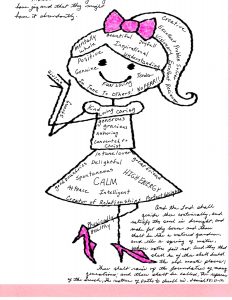 I made myself a “Who I Am” poster. I copied a drawing of a woman from the Internet. I picked a drawing that looked like the kind of woman I felt I wasn’t but wanted to be—perky and cute.
I made myself a “Who I Am” poster. I copied a drawing of a woman from the Internet. I picked a drawing that looked like the kind of woman I felt I wasn’t but wanted to be—perky and cute.



 One day while helping a friend in her home she asked me if I ever felt as if I was at war with my family. She said that if anything was organized it wouldn’t stay that way. If it was clean it would get dirty. If it was peaceful chaos would inevitably show up.
One day while helping a friend in her home she asked me if I ever felt as if I was at war with my family. She said that if anything was organized it wouldn’t stay that way. If it was clean it would get dirty. If it was peaceful chaos would inevitably show up. nine-year-old son, Jack, reached out and touched his mom on the arm and said, “Mom, I’m sorry we missed the bread and that we’re out in the hall.”
nine-year-old son, Jack, reached out and touched his mom on the arm and said, “Mom, I’m sorry we missed the bread and that we’re out in the hall.”
 who reminded him of the principle we’ve been discussing—simple things, done over time consistently, bring significant results. His servant said, “If the prophet had bid thee do some great thing, wouldest thou not have done it? How much rather then, when he saith to thee, Wash, and be clean?” (2 Kings 5:13).
who reminded him of the principle we’ve been discussing—simple things, done over time consistently, bring significant results. His servant said, “If the prophet had bid thee do some great thing, wouldest thou not have done it? How much rather then, when he saith to thee, Wash, and be clean?” (2 Kings 5:13).
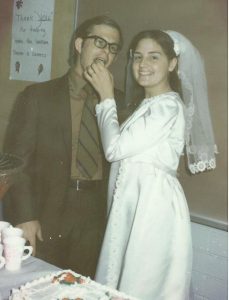 When I was a senior in high school I took a final sewing class. I picked out some darling pink and brown striped material for an outfit and went to work knowing that it was going to be fabulous. When I put it on the crotch was at my knees, the zipper zipped up the inside and the facing was on the outside. I had done my very best and my best stunk!
When I was a senior in high school I took a final sewing class. I picked out some darling pink and brown striped material for an outfit and went to work knowing that it was going to be fabulous. When I put it on the crotch was at my knees, the zipper zipped up the inside and the facing was on the outside. I had done my very best and my best stunk! absolutely every effort to learn to sew. I had asked for help from the experts in my life. I had put in the time. I had practiced repeatedly. I asked God to help me remember everything I had learned. I asked that I would understand the directions fully and that I wouldn’t make any more mistakes. And guess what, I didn’t. I sewed that dress without having to pick out another seam. I knew what to do and I did it well. The dress was simple but beautiful. In fact, my cousin was married in that almost 50-year-old dress this fall.
absolutely every effort to learn to sew. I had asked for help from the experts in my life. I had put in the time. I had practiced repeatedly. I asked God to help me remember everything I had learned. I asked that I would understand the directions fully and that I wouldn’t make any more mistakes. And guess what, I didn’t. I sewed that dress without having to pick out another seam. I knew what to do and I did it well. The dress was simple but beautiful. In fact, my cousin was married in that almost 50-year-old dress this fall.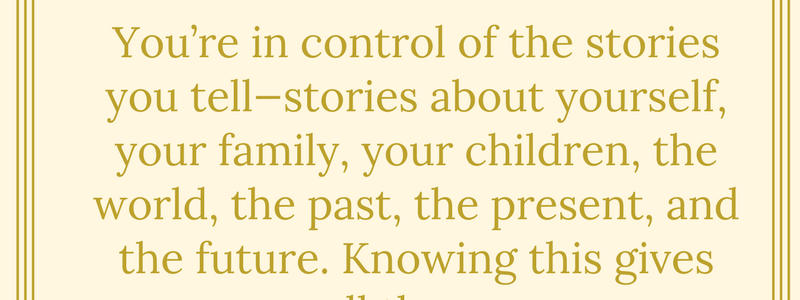
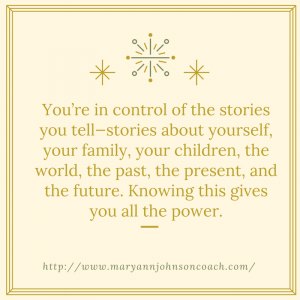 I keep thinking that I’ll switch topics from the power of controlling our story and response to another parenting topic but every day provides a new and powerful example of just what it looks like to control how we think and act.
I keep thinking that I’ll switch topics from the power of controlling our story and response to another parenting topic but every day provides a new and powerful example of just what it looks like to control how we think and act.
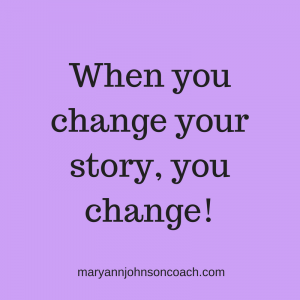 I grew up in a family that always had a dog. We had Sheppard’s and once we even had a giant poodle. We named him Expense.
I grew up in a family that always had a dog. We had Sheppard’s and once we even had a giant poodle. We named him Expense.




 more possibilities
more possibilities